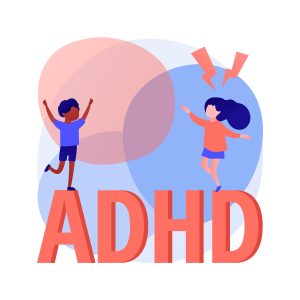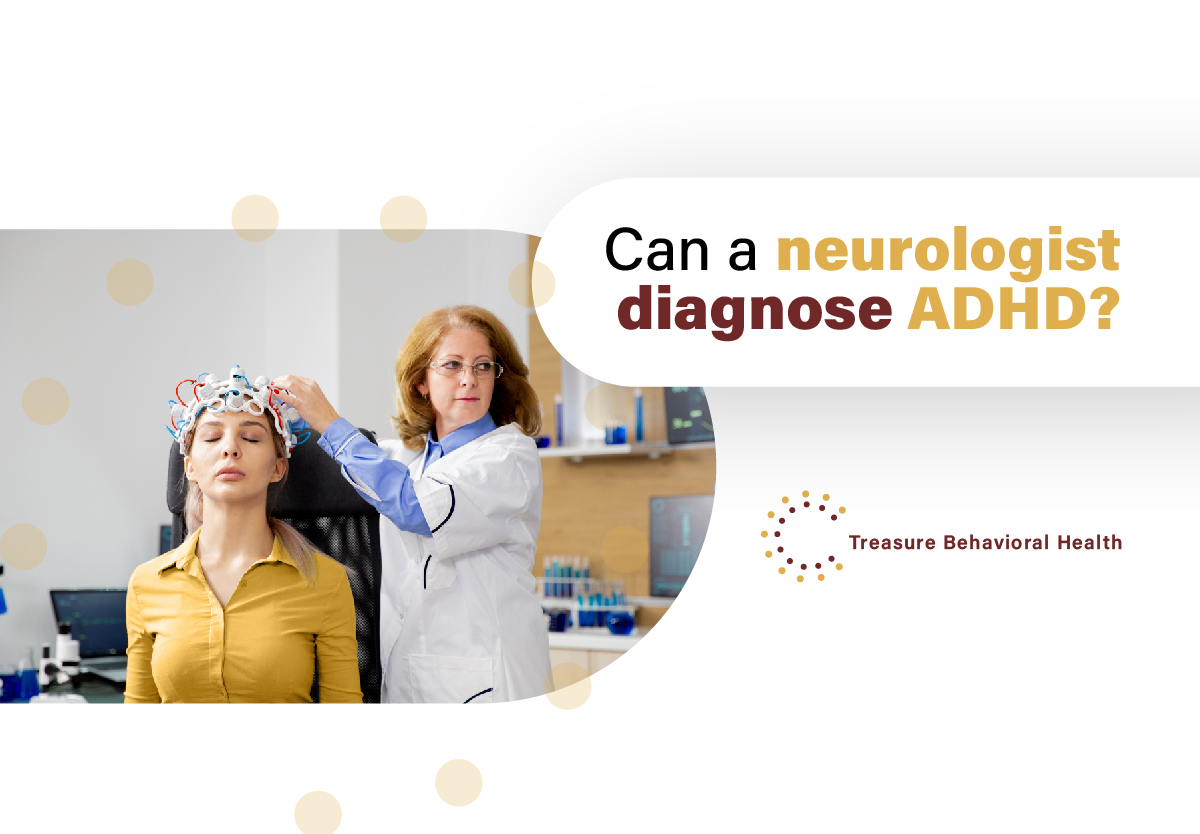Individuals with ADHD, whether in childhood or adulthood, grapple with challenges related to focus, impulse control, and hyperactivity, characterizing this neurodevelopmental disorder.
When it comes to diagnosing ADHD, many people wonder if a neurologist can play a role in the diagnostic process.
If you or someone in your family is facing ADHD issues, come to Treasure Behavioral Health. We’re here to help find the best solutions and make life happier for you.
Below we discuss “Can a Neurologist Diagnose ADHD?” Also, talk in detail about ADHD and how neurologists can play a vital role in the ADHD assessment process.
So, Let’s continue reading,
ADHD: What is it?

ADHD,a condition characterized by difficulties in maintaining attention, excessive activity, and impulsive behavior, frequently manifests in childhood and may persist into adulthood.
Adults with ADHD may struggle with organization, time management, impulsivity, and maintaining attention on tasks.
It is crucial to identify these symptoms accurately to ensure a diagnosis and the successful implementation of effective management strategies.
The Role of Neurologists
Medical doctors known as neurologists specialize in addressing disorders of the nervous system, encompassing the brain.
Although the diagnosis and treatment of ADHD are typically within the purview of psychiatrists and psychologists, neurologists can play a role in the ADHD assessment process.
Neurologists provide a distinct viewpoint, emphasizing the neurological facets of ADHD and eliminating other potential causes for symptoms.
Can a Neurologist Diagnose ADHD?
Neurologists aren’t usually the main experts for ADHD, they can help in the diagnosis, especially if there are concerns about other brain-related issues.
ADHD is mostly seen as a mental health matter, and doctors like psychiatrists and psychologists are often involved in diagnosis.
However, a neurologist may be brought in to check for any neurological problems that could be causing or contributing to ADHD-like symptoms.
How Does a Neurologist Diagnose ADHD in Adults?
Psychiatrists and psychologists are often primary in the diagnosis and treatment of ADHD.
Neurologists can play a valuable role in the ADHD assessment process, especially when there are concerns about other brain-related issues.
Here’s how neurologists can play a vital role in the ADHD assessment process:
- Thorough Examination
Neurologists examine the patient’s medical history, including any neurological conditions or injuries.
- Imaging Studies
In some cases, neurologists may recommend brain imaging studies such as MRI or CT scans to rule out other potential causes of symptoms.
- Neurological Tests
Assessing cognitive functions, attention, and executive functions provides additional insights into the neurological aspects of ADHD.
- Collaboration
Neurologists work with mental health professionals, combining neurological insights with psychological assessments.
Adult Attention Deficit Hyperactivity Disorder Symptoms
To better understand how a neurologist diagnoses ADHD, it’s essential to recognize common adult ADHA symptoms. These may include:
- Difficulty organizing tasks and activities
- Forgetfulness and frequent distraction
- Impulsivity and difficulty controlling impulses
- Challenges with time management
- Trouble sustaining attention on tasks
- Hyperactivity or restlessness
- Relationship difficulties due to ADHD-related behaviors
Find ADHD Assessments for Adults Near Me
To find an ADHD assessment for adults near you, you can follow these steps:
- Start by asking your regular doctor if they can help or recommend someone.
- Get in touch with psychologists, psychiatrists, or counselors who can do ADHD assessments.
- Contact your insurance company for a list of covered providers who specialize in ADHD.
- Use search terms like “ADHD assessment for adults near me
- Contact local mental health centers, especially those offering services on ADHD.
- Attend local ADHD support groups to get recommendations from others.
- Look for professionals on websites like Treasure Behavioral Health.
Treatment Options and Medications
Once diagnosed, a neurologist collaborates with other healthcare professionals to develop an appropriate treatment plan. This plan may comprise psychoeducation, counseling services, and the consideration of appropriate medications.
Treatment options for adult ADHD commonly involve medications, with stimulants and non-stimulants being two main categories, each carrying its array of advantages and potential side effects.
Below are the most commonly prescribed ADHD meds for adults.
Medications for ADHD
There are different medications for adults with ADHD:
- Adderall: Helps with concentration and impulsivity. It comes in immediate-release (IR) and extended-release (XR) forms, taken once or multiple times daily.
- Concerta (methylphenidate): Another stimulant is taken once a day in the morning. It has extended release, lasting for about 12 hours.
- Dexedrine (dextroamphetamine): A stimulant with short-acting and long-acting forms. Short-acting is taken multiple times a day, while long-acting is usually taken in the morning.
- Focalin (dexmethylphenidate): Comes in immediate-release (IR) and extended-release (XR) forms, taken once or twice daily, with effects similar to Adderall.
- Ritalin (methylphenidate): A short-acting drug, taken two to three times a day for immediate relief. Even the long-acting version doesn’t last as long as Concerta.
- Vyvanse (lisdexamfetamine): An amphetamine-based drug, available in capsule and chewable tablet forms. Typically starts with 30 mg, with a maximum of 70 mg.
- Strattera (atomoxetine): Non-stimulant medication taken once or twice a day. It’s the first of its kind approved by the FDA for ADHD, with mild reported side effects like sleepiness and reduced appetite.
ADHD Tests for Adults
Before or during your appointment, you may take an ADHD-type test to check for ADHD.
They could include filling out forms about your behavior and getting tested for other issues like learning disabilities, depression, or anxiety.
Your ADHD doctors will also ask about your medical history and do a physical exam to rule out other conditions that can look like ADHD, such as thyroid problems or seizure disorders.
Simple Ways to Manage ADHD
Here are some practical tips for managing ADHD:
- Follow a daily schedule to stay organized.
- Set achievable goals to build confidence.
- Create a quiet workspace and limit electronic distractions.
- Exercise regularly to improve concentration.
- Practice activities like deep breathing or yoga for stress relief.
- Seek support from friends, family, or support groups.
- Consult a doctor for medication options.
- Learn about ADHD to better manage it.
To Conclude
So, “Can a Neurologist Diagnose ADHD?” Not Exactly. Neurologists don’t diagnose ADHD, with psychiatrists and psychologists usually handling the assessment.
However, neurologists can contribute by examining medical history, conducting neurological tests, and ruling out other brain-related issues.
Collaborating with mental health professionals, and neurologists ensures a comprehensive understanding of the neurological aspects of ADHD.
If you need professional assistance in handling your ADHD and its impact on mental health, don’t hesitate to contact us at Treasure Behavioral Health for more information.
FAQs
Q: Do neurologists diagnose ADHD?
Neurologists usually don’t diagnose ADHD; it’s often done by mental health experts like psychiatrists or psychologists who assess behavior and symptoms.
Q: How can I control my ADHD without medication?
Create a routine, practice mindfulness, exercise regularly, and get support from therapy to manage ADHD without medication.
Q: What will happen if ADHD is not treated?
Untreated ADHD may pose challenges in maintaining focus, achieving success in academic or professional settings, and nurturing positive interpersonal connections.
Q: Does ADHD ever go away?
ADHD is a lifelong condition, but symptoms may change over time. While some people experience symptom reduction with age or effective management.
Q: What are ADHD symptoms in women?
Women with ADHD may find it hard to focus, be impulsive, and struggle with disorganization. They may also experience emotional sensitivity and self-esteem challenges.


No comment